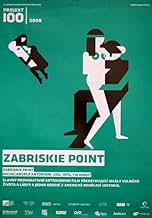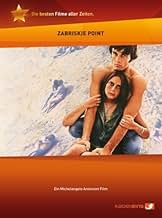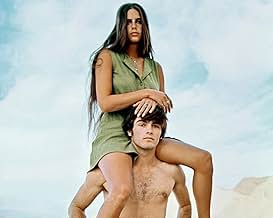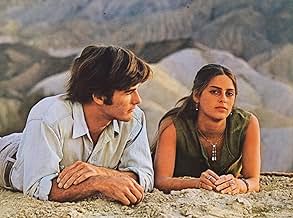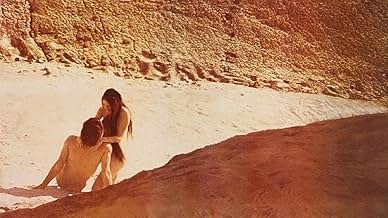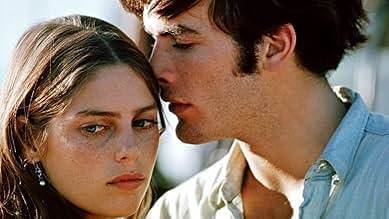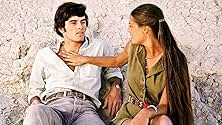Am Zabriskie Point, einer der tiefstgelegenen Stellen der Vereinigten Staaten, treffen sich zwei vollkommen Fremde: ein Student und eine junges Hippie-Mädchen, die eine hemmungslose Romanze ... Alles lesenAm Zabriskie Point, einer der tiefstgelegenen Stellen der Vereinigten Staaten, treffen sich zwei vollkommen Fremde: ein Student und eine junges Hippie-Mädchen, die eine hemmungslose Romanze beginnen und sich im Staub des Death Valley lieben.Am Zabriskie Point, einer der tiefstgelegenen Stellen der Vereinigten Staaten, treffen sich zwei vollkommen Fremde: ein Student und eine junges Hippie-Mädchen, die eine hemmungslose Romanze beginnen und sich im Staub des Death Valley lieben.
- Auszeichnungen
- 1 Gewinn & 1 Nominierung insgesamt
- Radical student
- (Nicht genannt)
- Police lieutenant on loudspeaker
- (Nicht genannt)
- Highway patrolman
- (Nicht genannt)
- Airport mechanic
- (Nicht genannt)
- University student
- (Nicht genannt)
- Arrested student
- (Nicht genannt)
- College student
- (Nicht genannt)
- Man in Deli
- (Nicht genannt)
- Gun store owner
- (Nicht genannt)
- …
- Departing Plane Passenger
- (Nicht genannt)
- Documentary cameraman
- (Nicht genannt)
Empfohlene Bewertungen
I have lived away from the US for 30 years and can now pretend to be able to understand what Antonioni was wanting to achieve. My view is that he has excelled. The film is a stunning indictment of the United States and, tragically, I see no remediation in the 29 years since it was first released.
Antonioni's predictable assault on capitalism is not only intellectually hollow, but has (or had) nothing new to offer; it's just the same old trigger-happy one-dimensional cops, businessmen discussing business deals (and what's wrong with that, isn't that how Antonioni's movies get made?), and endless shots of TV commercials and billboards advertising the oh-so morally decadent products for the abhorrent, selfish, and greedy right-wing rabble-population who thinks of no one but themselves, their families, their work, and their children.
Papa Smurf Antonioni, just like his long-haired Smurfs and Smurfettes of the late 60s, failed to notice the most obvious and vital aspect about their silly movement: they were allowed to have their laughable meetings and express their anti-establishment opinions freely within that very establishment, whereas the students in those countries whose left-wing systems they admired, did not (and still do not). By far the greatest irony about the hippies - and Antonioni, naturally, failed to realize this as well (his judgment being clouded by cocaine-snorting and an excessive intake of LSD) - is that hippies were (are) the garbage-residue of capitalism. This is an incredible irony. Only in a successfully-functioning capitalist system can you find that species called "hippie"; a spoiled, ungrateful, and selfish bunch of middle and upper-middle class losers.
The film itself seems to go on forever. Antonioni takes his sweet time with getting on with it, while including overlong scenes of pointlessness, with a high dullness factor. His attempts at symbolism are annoying and trite. His statements are highly dubious, at best. This film is Antonioni's way of saying that violent revolution is the solution. And this is what we get from an old, saturated, filthy-rich, fat film-maker who lives in villas and dines in the best French and Italian restaurants.
I don't remember seeing any major Western movie about the Tiananmen massacre of thousands of students in China. But when one Western student gets shot for waving Che Guevara's face into all our faces, we get ten major films about it at once. I suppose this means that a Chinese life is worth a thousand times less than a Western one at least to the left-wing hypocrites who infest movies.
If you're a Marxist neo-hippy and disliked this awful review, please klick "NO" below.
For some reason it's never totally left my conscience yet generally for all the wrong reasons. While the cinematography is certainly impressive throughout I found that the whole ordeal just dragged, and dragged...and dragged, literally to the point of tedium. In the first instance then, Zabriskie Point is clearly suffering from pace, or lack of. The 'desert' or 'love' scene being a prime example of this - it's not art; it's not even vaguely artistic - but mundane and self indulgent. The gorgeous and sweltering locales of the desert are what's worth noting here; not two young protagonists who appear to share little, if no, connection.
In that respect it would seem that most people's opinions of Zabriskie Point are either deeply 'for' it or very much 'against' it. Were the 60s really like this?! Zabriskie Point seems to linger on too many stereotypes and while films such as Easy Rider managed to successful capture the ambience of counter-culture 1960s America Zabriskie Point falls just a bit short. Antonioni certainly knows how to lay-on some thick anti-establishment slurs but it's just so blatantly obvious and very hard to believe. On the plus side, the documentary-esque footage at the start of the film does help to give off a very 'real' vibe and is duly convincing. The acting, or lack of, is apt to an extent but hardly noteworthy. This is the frustrating element - it just seems to try so hard and has now gained a small reputation of being somewhat of a 'cult classic' but it's not justified. For those who try to read what they want to read into a film for the sake of art or intellect; those who subsequently look for hidden meanings that aren't there - maybe try this. If I wanted to do that I'd happily watch El Topo - not that I would ever compare the two.
Oh, did I mention Pink Floyd contributed to the soundtrack perhaps one of the only serious redeeming qualities here. Thanks Dave and Roger.
6/10
What he does lack is a point, at least the kind of point that he could bring in Blow-Up and The Eclipse. You get the feeling of what is around these characters, what the themes are bringing forth to their consciousness, however in this case the characters and the actors don't bring much conviction or purpose. Antonioni, coming from the school of hard-knocks, neo-realistic film-making, does do what he can with his mostly non-professional cast (those who look most like real actors are subjugated to the roles of the corporate characters), but the two stars Mark Frechette and Daria Halprin seem as if Antonioni's under-directing them. Perhaps that was the point. The story's split into three acts, thankfully not too confusing, as Mark escapes his existence around the boiling, dangerous campus life going on in the circa late 60's LA area, and Daria is sent out from LA to drive to Phoenix for some business meeting. They meet by chance as Mark's plane (how does he know how to drive, maybe a little background info there?) and Daria's car meet up, and they spend some time together in an existential kind of groove out in the desert. Aside from a stylistically mesmerizing if bizarre sex scene, much of this act isn't terribly interesting.
The two leads are fair enough to look at, but what exactly draws them to each other outside of curiosity? The ideas that come forth (in part from a screenplay co-written by Sam Shepard) aren't too revealing, except for one brief instant where drugs vs. reality is brought up. Then the film heads towards the third act, as Mark decides to do the right thing, under disastrous circumstances, and Daria arrives at her boss' place, only to be in full disillusionment (not taking into account the infamous last five minutes or so of the film). Although the film took its time telling its story, I didn't have as much of a problem with that as I did that the story only engages a certain kind of viewer. I understand and empathize with the feelings and doubts and fears as well as the self-confidence of the "anti-establishment", but maybe Antonioni isn't entirely fully aware of it himself. In some scenes he as director and editor (and the often astounding cinematography by Alfio Contini) find the scenery and backgrounds more enlightening and fixating than the people in the foreground. Not to say the technical side of Zabriskie Point isn't involving to a degree (this may make some feel drowsy, as Antonioni is probably far greater as a documentary filmmaker as he is a theatrical director like say Francis Ford Coppola is).
The deserts, skies, city, and even the faces in close-ups are filmed with the eye of a filmmaker in love with the art of getting things in the frame, bringing us in. The soundtrack is equally compelling, with a master stroke including a sweet Rolling Stones song at one point, and then a crushing, surreal Pink Floyd song (re-titled from 'Careful with that Axe Eugene, one of their best pre-Dark Side) in the explosion sequence. If only the performances weren't so one-sided I might find this to be on par with Blow-Up or The Eclipse. It's an unconventional stroke of genius on one hand, and on the other a boring take on what was the hippie/radical movement of the late 60's. But hey, what may be boring for an American such as myself born in the eighties may not be to others outside the US, such as say, Italy. And it does ask to not be discarded right away after one viewing.
Even from a purely technical point of view, it is a remarkably crafted film; from the opening credits sequence to the bizarre desert 'love-in', to the use of billboards, and right down to that jaw-dropping, cathartic finale that used 17 camera set-ups (in it's own way, as powerful as the climax of The Wild Bunch). Also, Antonioni chose one hell of a leading lady with Daria Halperin, one of the most beautiful ever to grace the screen. There isn't much 'acting' involved, as this feels more like a docu-drama, and so the use of non- professionals as the lead couple works quite effectively within that context. And the soundtrack is not only filled with marvelous music, its use is impressive as well (I can't forget the start of the film, mostly due to the selection of music - by Pink Floyd - that grooms the visuals so well).
Contrary to popular opinion, this is quite an achievement in cinema, and one I would enthusiastically recommend to anyone with a taste or tolerance for the off- beat. Well worth seeking out, and one of those key films of the 60s that demands a DVD restoration/release.
Wusstest du schon
- WissenswertesAntonioni met with Jim Morrison during early production to ask for a musical contribution to the soundtrack. Morrison and the Doors provided "L'America" which Antonioni then rejected.
- PatzerZabriskie Point, in Death Valley National Park (California, USA) is not actually the lowest-elevation point in the United States. That would be Badwater Basin, at a depth of 282 feet below sea level, which is also located in Death Valley National Park about 20 miles away.
- Zitate
[booking a protester]
Cop: Occupation?
William S. Polit, protester: Associate professor of history.
Cop: That's too long, Bill. I'll just put down clerk.
- Alternative VersionenIn the original version, the song that's playing when Daria drives away at the very end and over the closing "End" title card is a Roy Orbison song, but in the 1984 MGM/UA Home Video version it's a continuation of the Pink Floyd song. The 1991 MGM/UA Home Video version restores the Orbison song.
- VerbindungenEdited into Geschichte(n) des Kinos: La monnaie de l'absolu (1999)
Top-Auswahl
- How long is Zabriskie Point?Powered by Alexa
Details
Box Office
- Budget
- 7.000.000 $ (geschätzt)
- Weltweiter Bruttoertrag
- 84.879 $
- Laufzeit1 Stunde 53 Minuten
- Sound-Mix
- Seitenverhältnis
- 2.35 : 1


